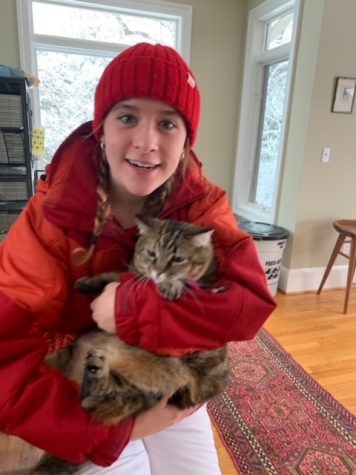Local News Is Dying, Here’s How We Save It

Photo by Stella Gunn
January 30, 2023
There is a societal pressure to be an informed citizen, whether that be through pop-culture, music, or news, people define themselves by what they pay attention to. It is a natural impulse to turn one’s view outward, to escape one’s own life. For instance, seeing a natural disaster on the news, and gaining perspective over one’s own problems is one of the many ways empathy and gratitude are created. Yet in the midst of all this simulated connection, many forget: the best way to hone these qualities is through connecting with one’s immediate surroundings.
There are many worthy causes to dedicate one’s time to, however, any young person navigating the vast realm of information should be aware of the polarizing nature of many dominant sources. National news outlets seek to make something that will turn heads. In the rat race for reader’s attention, they resort to graphic violence, extreme pathos, misinformation, and impossible claims. However, most improvements come from focusing on the issues that affect our own community. In the end, this pursuit is not in opposition to broad-scale change, but simply the first step. Local journalism aims to provide information and unlike national news sources, does not push an opinion onto an individual.
“Good local journalism resists easy left-right ideological categorization and helps people understand something well enough that they can come to their own conclusions. I think people in general trust their local paper or TV news station more than the New York Times or CNN. That means local journalists are critical to preventing radicalization,” said Alice Berry, reporter for The Daily Progress.
National news survives off of polarization, as each source must provide a distinct political leaning to engage viewers who could choose among a plethora of news outlets. They gain readers by establishing their demographic and then providing exactly what that demographic wants to see. True journalism caters to no one, it is simply the unbiased search for truth. Local news coverage lifts the veil of partisan divide, creating a more clear picture of the government processes taking place in our communities.
“The overwhelming majority of local positions across the country […]are non-partisan positions, so sometimes people will, say run as a democrat or republican to generate support, but the positions themselves and the issues they cover, you know filling potholes, dealing with sanitation, are not partisan issues. If people saw more of what was actually going on in their local communities, they might be more inclined to realize that at least at the local level, a lot of problems can be solved in a non-partisan, less polarized way,” said Lawless.
Local news benefits from the unification of a community, leading to more active citizens, more community events, and more readers. Although local journalism is essential for an active community, and a crucial avenue for creating change, in the infinite realm of national and global media, local coverage is quickly vanishing. Lawless is one of the authors of News Hole: The Demise of Local Journalism and Political Engagement, a book that attributed the decline of community and political involvement to the disappearing local coverage on congressional races in the last 20 years,
“When it comes to local news, coverage is dying, and that’s making it a lot harder for people to have the information they need to feel like they can participate, to feel like they can hold elected officials accountable, to feel like they can weigh in on important public policies, and to quite frankly feel like they’re a part of a community. That’s why we think the inquiry is really important, and we think trying to figure out how to resuscitate local news is key to resuscitating civil engagement.” Said Lawless.
If citizens are not aware of the legislation and changes taking place in their community, the people essentially lose their ability to hold the government accountable. The very pillar of democratic federalism is undermined if the people do not have access or coverage on the local forms of bureaucracy. Lawless responded to the question, Does the dwindling availability of news covering local politics allow government officials to get away with more?
“I think that, when no one is looking, there is a greater incentive for politicians to behave badly. And so, when the press aren’t covering school board meetings, or when journalists are not reporting on city council meetings, it’s more likely that people who hold elected positions are not going to be worried about how their constituents would react to a decision that they’re making.”
Another distraction to honest and ethical coverage is the ubiquitous means of sharing information. Free speech is a central idea to the American people, but the rise of technology has complicated the matter. Richard DiCicco, the Editor of Cville Weekly, added another perspective to the importance of ethical journalism in the age of unmonitored information.
“I think journalism is at a really crucial inflection point, I think that it’s flourishing,[…]because anybody can be a journalist, anybody can pick up a camera or their phone, which is now a camera, which is now a voice-recording device, and record what’s going in front of them, in their community, and they can put that on the internet. But, that means that there are also chances to, you know, make a knee-jerk reaction about what something is. There’s a chance for bad actors to come in and try to change a narrative, um so it’s… it’s messier now.” DiCiccio said.
In the sea of information and falsities, people need sources of news they can trust and local news promotes community. There is a common misconception that local news doesn’t cover serious issues, but this is not true. DiCicco commented on navigating an environment full of national and local adversity and how local newspapers have a different objective in covering tragic events.
“I think it’s important to inform the community about those events when they happen, but one of the things I’ve been trying to do here […] is to follow that story past the horror, we’re trying to follow up on how that community heals, how that community comes together.”
This type of diligence and follow-up is reporting that is often only available at a local level. In national news as fast as the last tragedy strikes, a new one will almost instantly take its place on the front page. Local journalists have the ability to tell a whole story, and to focus on a truth that can bring people together.
“There’s opportunities to tell different narratives (in local journalism), especially more nuanced narratives, unfortunately it’s like, people tend to talk about Charlottesville in the same breath in you know as August 12th in 2017, and now they talk about it in the same breath as this shooting, it’s a very limited narrative about what this town is,” DiCicco commented.
To redefine Charlottesville, the citizens must become involved in the picture we paint. Although information on local issues is disappearing before our eyes, the community’s support of local news outlets can resuscitate the need for transparent reporting. There are many access points to change, but establishing a demand for local coverage ensures journalism will live on. As outlined in the constitution, the freedom of press and assembly are unalienable rights, which ensure the people play a part in the changes that take place in their communities. The greatest defense against government corruption is an informed public, making journalism inherently necessary to the maintenance of our democracy.
Local news outlets:
https://www.cvilletomorrow.org
https://millercenter.org/issues-policy
City council meetings: https://www.charlottesville.gov/677/City-Council
School board meetings: http://charlottesvilleschools.org/schoolboard





